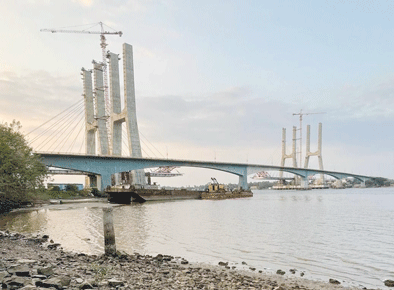DASHED: The hopes of Union Minister for Transport Nitin Gadkari in completing the new Zuari bridge before schedule has crashed, as the Ukrainian engineering firm can no longer send experts and material required to India.
The huge increase in the cost of petrol,diesel and natural gas has hit the real estate business industry as well. Buildings requires movement of a wide range of raw materials and human resources. An example is the delay in the completion of the Zuari bridge which is being designed by a company from Ukraine.
By Vandana Ramnani
Prices of under-construction estate may spike as a surge in global crude rates is seen ending local fuel price freeze with the rise in domestic fuel and diesel prices cascading into raw materials used for projects such as cement.
Global crude touched a multi-year high of $139 per barrel earlier this week and Brent oil has risen 29% in just two weeks. The resulting hike in domestic fuel prices will spike transportation costs that account for up to 20% of construction expenses.
At the same time, steel prices have risen about 17% in just a week, and so have cement rates. The combined impact of this surge in input costs will push up construction costs.
“Overall, the increase in raw material costs can lead to price escalation especially for under-construction projects. This could dent sentiment at a time when the residential sector has been seeing a revival in demand across segments. Moreover, in the absence of strong incentives in the recent budget, developers may need to pass on the likely hike in raw material costs to end users. Overall, there could be a cautious sentiment amongst homebuyers until prices settle,” said Ramesh Nair, CEO, India, and MD, market development, Asia, Colliers.
However, Sransh Trehan, MD, Trehan Group, doesn’t see much impact of the war on demand as various factors favour homebuyers like stable property prices, historical low home loan interests and supply of housing units.
But developers will have to increase property prices to maintain profit margins as costs of steel, cement, and labour, among others have been rising over the last couple of years and the current global situation will further fuel inflation, he added.
National Real Estate Development Council (Naredco) has said in a letter to the housing and urban affairs minister Hardeep Puri that the sector that was showing green shoots is now “in this delicate stage of rising input prices badly impacting developers. While steel prices have increased by more than 60-100% in the last one year, prices of cement have gone up by 40-70% in different regions”.
“Cement prices have increased from Rs 270-300 to Rs 450-500 during the last one year. They are likely to increase further in the coming months,” the letter written by Sandeep Runwal, president, Naredco, Maharashtra, said.
The developer body has asked the ministry to consider reduction of GST on cement and steel as well as curbing export of steel for two years.
It said that the import duty of steel should be reduced from 7.5% to zero for a period of two years and cement imports should be allowed.
Niranjan Hiranandani, national vice chairman of the body and MD of Hiranandani Group, said soaring input costs will change calculations of project costs which will impact house prices.
“Inflation impacted fuel prices will impact logistics and supply chain, resulting in cost overruns,” he added.
KT Jithendran, CEO, Birla Estates, however, said that he does not expect any long term impact due to rise in cement prices. “There could be a hiccup as increase in fuel prices sets an inflationary trend in the market. Overall the impact is expected to be minimal,” he added.
Courtesy: Money Control
